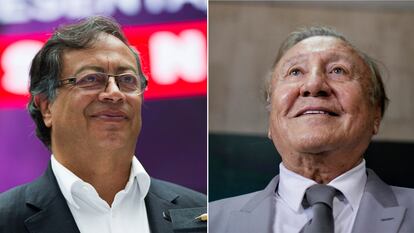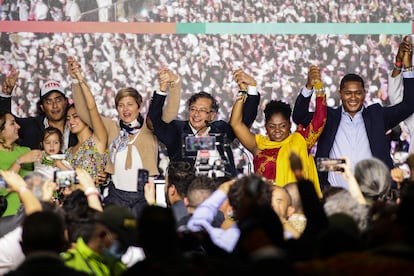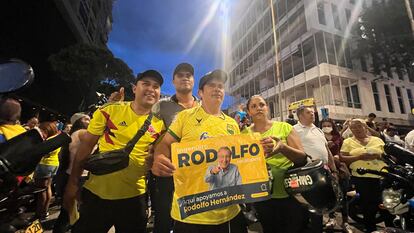Gustavo Petro or Rodolfo Hernández: Colombia votes against the political establishment
The left-wing leader has won the first round with 40.3% of support and will face the former mayor of Bucaramanga (28.2%) at the June 19 presidential election


Colombia voted on Sunday against the political establishment that has always governed the country. The leftist leader, Gustavo Petro, won the first round of the election with 40% of the vote, followed by the populist candidate, Rodolfo Hernández, with 28%. Colombians chose change over continuity and closed the door to the political tradition marked by former president Álvaro Uribe. This tradition – known as uribismo in Spanish – has propelled the presidents of the last two decades into government. But while uribismo’s candidate Federico “Fico” Gutiérrez lost on Sunday, it is resisting losing power altogether.
Petro, 62, was the clear winner on Sunday, but this was just the first round of the presidential race. Colombians will head to the polls again on June 19 to vote between Petro and Hernández. This will be the true test of whether Petro has been able to sway a country where the left has never governed. The surprise rise of Hernández, the 77-year-old former mayor of Bucaramanga, suggests it will be a very tight race.
The big loser of the day was Gutiérrez. The former mayor of Medellín was the face of continuity during the campaign, a position that led to his demise. Although Gutiérrez presented himself as an independent politician, he was supported by the political establishment – from uribista groups to the two great traditional parties, the Conservatives and the Liberals, which decided to close ranks and support him in a bid to stop Petro’s advance. After the results were announced, Gutiérrez conceded defeat and fully endorsed Hernández for the second round. That complicates things for Petro. Gutiérrez won 24% of the vote, the equivalent of five million votes. While nearly six million people voted for Hernández. If everyone who voted for Gutiérrez, decides to cast their ballot for Hernández, the populist would have 11 million votes. This is more than the 8.5 million votes Petro won on Sunday.
Election day went ahead normally throughout the country after one of the tensest campaigns in Colombia’s recent history. Voters went to the polls believing that Petro would win the first round, but no one was willing to bet on who would come in second place. For months, the polls had pointed to a two-way battle between Petro and Gutiérrez, but as the vote approached, both candidates began to stagnate, while Hernández started to make ground. The extent of his rise, however, was not reflected in the polls, which under Colombia’s electoral law cannot be published in the 10 days leading up to an election.

Hernández – who many are already calling the “Colombian Trump” – crept ahead in this time period, despite the fact that he did not take part in any election debate, instead rallying followers on Instagram and Facebook. But while few saw him coming, the populist was convinced of a victory, claiming on Sunday: “Today we are making history.”
Given the low public opinion of the political elite, Petro would have preferred to face Guitérrez at the June 19 election. The left-wing leader has navigated uncertainty throughout the campaign, always with a comfortable lead in the polls. But the unexpected rise of Hernández has turned the election on its head and sparked alarm bells within the Historic Pact for Colombia, the political coalition that chose him as the candidate for the 2022 presidential poll.
Petro was nervous when he arrived at the polling station, aware that this was his last chance. He even forgot his ID card, which is the only requirement to vote, and had to wait until someone brought it to the station. When he was finally able to cast his ballot, he invited citizens “to change the history of the country.”
Much of Colombia voted for that idea: for a change after decades of conservative governments in the hands of the same political elite. In the previous 2018 election, the establishment candidate Iván Duque won in the first round and again in the second against Petro. But the honeymoon was short-lived. Just a year after being elected, Duque was faced with mass street protests, which intensified in 2021, when two-month-long demonstrations swept across the country and paralyzed entire cities.

The vote on Sunday shows that the country wants change at all costs: be it a shift to the left with Petro or in an unknown direction with Hernández. The political establishment has made it clear that they want anyone other than Petro to win, and have thrown their support behind the 77-year-old populist. The only political experience Hernández has is as the mayor of Bucaramanga, where there is a case open against him for corruption.
Hernández’s victory is reminiscent of Pedro Castillo’s shock win in the first round of elections in Peru in 2021. Some TV stations did not even have a photo of him to use when the results were announced, and had to use a generic silhouette. Today Castillo is the president of Peru.
Hernández’s face is well known in Colombia, but less is known about his political platform, which he does not hesitate to contradict if the occasion merits it. The upcoming weeks will serve to reveal more about where he stands on key issues. After a campaign that revolved around Petro, now it is Hernández who is set to be the protagonist. The first round ended on Sunday, but a new campaign has now begun. Colombia has another tense three weeks ahead.
Tu suscripción se está usando en otro dispositivo
¿Quieres añadir otro usuario a tu suscripción?
Si continúas leyendo en este dispositivo, no se podrá leer en el otro.
FlechaTu suscripción se está usando en otro dispositivo y solo puedes acceder a EL PAÍS desde un dispositivo a la vez.
Si quieres compartir tu cuenta, cambia tu suscripción a la modalidad Premium, así podrás añadir otro usuario. Cada uno accederá con su propia cuenta de email, lo que os permitirá personalizar vuestra experiencia en EL PAÍS.
¿Tienes una suscripción de empresa? Accede aquí para contratar más cuentas.
En el caso de no saber quién está usando tu cuenta, te recomendamos cambiar tu contraseña aquí.
Si decides continuar compartiendo tu cuenta, este mensaje se mostrará en tu dispositivo y en el de la otra persona que está usando tu cuenta de forma indefinida, afectando a tu experiencia de lectura. Puedes consultar aquí los términos y condiciones de la suscripción digital.








































